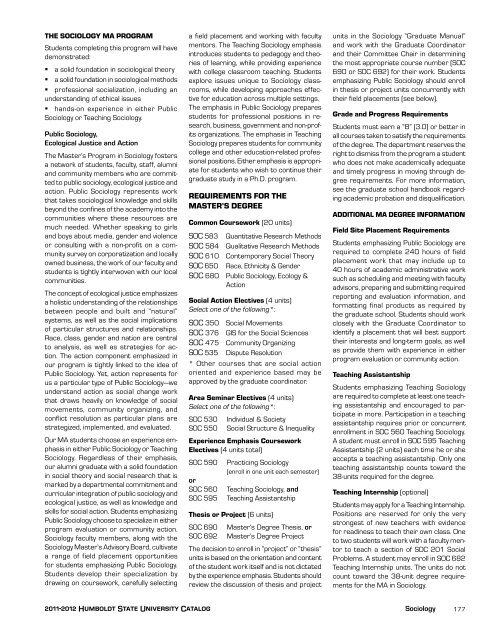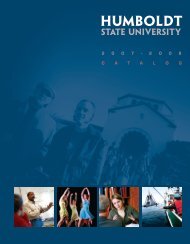2011-12 Academic Year - Bad Request - Humboldt State University
2011-12 Academic Year - Bad Request - Humboldt State University
2011-12 Academic Year - Bad Request - Humboldt State University
Create successful ePaper yourself
Turn your PDF publications into a flip-book with our unique Google optimized e-Paper software.
THE SOCIOLOGY MA PROGRAM<br />
Students completing this program will have<br />
demonstrated:<br />
a solid foundation in sociological theory<br />
a solid foundation in sociological methods<br />
professional socialization, including an<br />
understanding of ethical issues<br />
hands-on experience in either Public<br />
Sociology or Teaching Sociology.<br />
Public Sociology,<br />
Ecological Justice and Action<br />
The Master’s Program in Sociology fosters<br />
a network of students, faculty, staff, alumni<br />
and community members who are committed<br />
to public sociology, ecological justice and<br />
action. Public Sociology represents work<br />
that takes sociological knowledge and skills<br />
beyond the confines of the academy into the<br />
communities where these resources are<br />
much needed. Whether speaking to girls<br />
and boys about media, gender and violence<br />
or consulting with a non-profit on a community<br />
survey on corporatization and locally<br />
owned business, the work of our faculty and<br />
students is tightly interwoven with our local<br />
communities.<br />
The concept of ecological justice emphasizes<br />
a holistic understanding of the relationships<br />
between people and built and “natural”<br />
systems, as well as the social implications<br />
of particular structures and relationships.<br />
Race, class, gender and nation are central<br />
to analysis, as well as strategies for action.<br />
The action component emphasized in<br />
our program is tightly linked to the idea of<br />
Public Sociology. Yet, action represents for<br />
us a particular type of Public Sociology—we<br />
understand action as social change work<br />
that draws heavily on knowledge of social<br />
movements, community organizing, and<br />
conflict resolution as particular plans are<br />
strategized, implemented, and evaluated.<br />
Our MA students choose an experience emphasis<br />
in either Public Sociology or Teaching<br />
Sociology. Regardless of their emphasis,<br />
our alumni graduate with a solid foundation<br />
in social theory and social research that is<br />
marked by a departmental commitment and<br />
curricular integration of public sociology and<br />
ecological justice, as well as knowledge and<br />
skills for social action. Students emphasizing<br />
Public Sociology choose to specialize in either<br />
program evaluation or community action.<br />
Sociology faculty members, along with the<br />
Sociology Master’s Advisory Board, cultivate<br />
a range of field placement opportunities<br />
for students emphasizing Public Sociology.<br />
Students develop their specialization by<br />
drawing on coursework, carefully selecting<br />
a field placement and working with faculty<br />
mentors. The Teaching Sociology emphasis<br />
introduces students to pedagogy and theories<br />
of learning, while providing experience<br />
with college classroom teaching. Students<br />
explore issues unique to Sociology classrooms,<br />
while developing approaches effective<br />
for education across multiple settings.<br />
The emphasis in Public Sociology prepares<br />
students for professional positions in research,<br />
business, government and non-profits<br />
organizations. The emphasis in Teaching<br />
Sociology prepares students for community<br />
college and other education-related professional<br />
positions. Either emphasis is appropriate<br />
for students who wish to continue their<br />
graduate study in a Ph.D. program.<br />
REQUIREMENTS FOR THE<br />
MASTER’S DEGREE<br />
Common Coursework (20 units)<br />
SOC 583 Quantitative Research Methods<br />
SOC 584 Qualitative Research Methods<br />
SOC 610 Contemporary Social Theory<br />
SOC 650 Race, Ethnicity & Gender<br />
SOC 680 Public Sociology, Ecology &<br />
Action<br />
Social Action Electives (4 units)<br />
Select one of the following*:<br />
SOC 350 Social Movements<br />
SOC 376 GIS for the Social Sciences<br />
SOC 475 Community Organizing<br />
SOC 535 Dispute Resolution<br />
* Other courses that are social action<br />
oriented and experience based may be<br />
approved by the graduate coordinator.<br />
Area Seminar Electives (4 units)<br />
Select one of the following*:<br />
SOC 530 Individual & Society<br />
SOC 550 Social Structure & Inequality<br />
Experience Emphasis Coursework<br />
Electives (4 units total)<br />
SOC 590 Practicing Sociology<br />
(enroll in one unit each semester)<br />
or<br />
SOC 560 Teaching Sociology, and<br />
SOC 595 Teaching Assistantship<br />
Thesis or Project (6 units)<br />
SOC 690 Master’s Degree Thesis, or<br />
SOC 692 Master’s Degree Project<br />
The decision to enroll in “project” or “thesis”<br />
units is based on the orientation and content<br />
of the student work itself and is not dictated<br />
by the experience emphasis. Students should<br />
review the discussion of thesis and project<br />
units in the Sociology “Graduate Manual”<br />
and work with the Graduate Coordinator<br />
and their Committee Chair in determining<br />
the most appropriate course number (SOC<br />
690 or SOC 692) for their work. Students<br />
emphasizing Public Sociology should enroll<br />
in thesis or project units concurrently with<br />
their field placements (see below).<br />
Grade and Progress Requirements<br />
Students must earn a “B” (3.0) or better in<br />
all courses taken to satisfy the requirements<br />
of the degree. The department reserves the<br />
right to dismiss from the program a student<br />
who does not make academically adequate<br />
and timely progress in moving through degree<br />
requirements. For more information,<br />
see the graduate school handbook regarding<br />
academic probation and disqualification.<br />
ADDITIONAL MA DEGREE INFORMATION<br />
Field Site Placement Requirements<br />
Students emphasizing Public Sociology are<br />
required to complete 240 hours of field<br />
placement work that may include up to<br />
40 hours of academic administrative work<br />
such as scheduling and meeting with faculty<br />
advisors, preparing and submitting required<br />
reporting and evaluation information, and<br />
formatting final products as required by<br />
the graduate school. Students should work<br />
closely with the Graduate Coordinator to<br />
identify a placement that will best support<br />
their interests and long-term goals, as well<br />
as provide them with experience in either<br />
program evaluation or community action.<br />
Teaching Assistantship<br />
Students emphasizing Teaching Sociology<br />
are required to complete at least one teaching<br />
assistantship and encouraged to participate<br />
in more. Participation in a teaching<br />
assistantship requires prior or concurrent<br />
enrollment in SOC 560 Teaching Sociology.<br />
A student must enroll in SOC 595 Teaching<br />
Assistantship (2 units) each time he or she<br />
accepts a teaching assistantship. Only one<br />
teaching assistantship counts toward the<br />
38-units required for the degree.<br />
Teaching Internship (optional)<br />
Students may apply for a Teaching Internship.<br />
Positions are reserved for only the very<br />
strongest of new teachers with evidence<br />
for readiness to teach their own class. One<br />
to two students will work with a faculty mentor<br />
to teach a section of SOC 201 Social<br />
Problems. A student may enroll in SOC 682<br />
Teaching Internship units. The units do not<br />
count toward the 38-unit degree requirements<br />
for the MA in Sociology.<br />
<strong>2011</strong>-20<strong>12</strong> <strong>Humboldt</strong> <strong>State</strong> <strong>University</strong> Catalog Sociology<br />
177

















